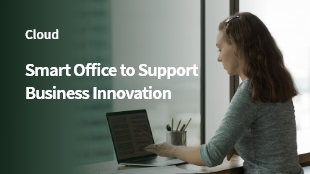
Corporate digital transformation aims at BM innovation, but the way of proceeding with it is different for each transformation. There are extensive digital transformations that digitize manufacturing production lines in the factory, and there are partial digital transformations that digitize marketing for customers. In fact, the most universal and effective way among many others is to apply digital transformation to the working culture, that is, the way of working. It does not require significant investment and risk, and it has excellent practical effects because it can be applied to all employees in all fields. The digital transformation of the way of working ranges from changing systems related to collaboration, reporting, and approval to data-driven decision making (DDDM). Among them, smart offices are a method that can be easily applied because they do not require any effort on the part of the employees. They help companies optimize space and employees have a more comfortable, smart working environment, as non-face-to-face meetings and remote work have increased after COVID-19.
Components of smart offices
Smart offices refer to providing a company's work environment optimized for smart work, digital work, and remote meetings. In fact, some companies and public institutions have already been implementing them even before COVID-19. Part of such efforts is to provide laptops or tablets to all employees so that they can work in unfixed seats rather than assigned seats, and support them to connect to the company's intranet or company system so that they can work outside the company, such as at coffee shops or home.
Such smart offices eventually exist to help employees work more comfortably and efficiently. Therefore, they should not only be supported by work spaces and portable work devices, but it is also necessary to improve the company's overall operating system and supplement the in-house Internet system to make it easier to work remotely using these devices. Security is important to connect to corporate systems through multiple devices, such as desktops, laptops, tablets, and smartphones, regardless of location and time outside of the company. In addition, flexible system configurations should be provided so that they are compatible and connected with multiple devices.
Moreover, to remotely connect at different times and different places to hold meetings, work on documents, and collaborate, it is necessary to update and manage changes while viewing the same document. Of course, cloud-based virtual computing systems are also required to provide a consistent work experience in different computing and Internet environments. A more complete smart work experience is possible only when these systems are in place. When it comes to smart offices, not just the office environment or devices, such as computers need to be changed; cloud system support is also essential to security and a consistent user experience.
In this regard, systems, such as the mobile desks and server-based computing (SBC) built by Samsung SDS are key technologies for building a smart office. The SBC allows the central server to manage all document tasks or data performed on a PC, enabling document management with the same file, no matter what computer device is used. Since it is not necessary to store files separately for each device, the effort and time required to manage file versions are reduced. In particular, security issues that may occur when using a general-purpose cloud can be solved through the SBC. The SBC solves the problem of personal information leakage by separating the environments of the personal PC and business PC and is useful for businesses, as it enables the same file management. In particular, business documents stored individually on personal PCs can be integrated and managed on the company's central server, making it easier to share documents and collaborate by department or task. In a word, it is possible to convert the company knowledge into assets. It also helps with the smart work of the entire company.
VDI that completes smart offices
VDI refers to virtual desktop infrastructure, which means a service that connects to various devices, such as PCs and mobile devices to build a virtual PC environment for working anytime, anywhere. Using such a system supports not only the existing desktop but also various types of computers and mobile devices so that smart business can be performed with the same experience. This not only provides a consistent work experience but also greatly helps expand the system's resources and set up new PCs.
For example, to support a better work environment, the performance of computers must be upgraded every year. It takes time and money to replace the actual hardware each time. However, VDI can rapidly expand resources. If only the central server is expanded, the computer performance of users connected to VDI can be improved immediately. Moreover, VDI can perform maintenance operations and respond to failures immediately. Of course, since the installation and management of new software is also done on a central server, it is convenient because it does not require each user to perform tasks individually.
In fact, when Samsung SDS's VDI is applied, the time required to expand computing resources is reduced from 7 days to 10 minutes, and the time required to set up and distribute new PCs is reduced from 2 hours to 30 minutes. In addition, it effectively solves various security issues that companies are concerned about, such as security, viruses, hacking that occurs on individual computers of company members, unauthorized access, and leakage of important data.
Implementation of smart offices starts with the office space and devices used by members, but what completes smart offices is the software, computers, and Internet experiences of members. It is VDI that completes it after all. Through PC virtualization, the work productivity of individuals, as well as the entire company, will be further improved, and that will be the foundation that enables smart work.
▶ The content is protected by the copyright law and the copyright belongs to the author.
▶ The content is prohibited to copy or quote without the author's permission.

He’s interested in and studying how technologies make changes in our daily lives and society, and how they can be used for BM innovations in companies.

